Industrial Robots in Automotive Manufacturing: IDTechEx Asks Whether Electric Vehicles will Reduce the Demand
BOSTON, Nov. 14, 2022 /PRNewswire/ --
The Adoption of Automation Typically Accelerates After Crisis
Robotics and automation have gained significant momentum during the past two decades. However, with the recent global turmoil, the increasing likelihood of recession, unprecedented inflation in many countries, and geopolitical tensions, many challenges in the manufacturing industry have been exacerbated. Nevertheless, IDTechEx believes that automation and robots in the manufacturing industry will regain their fast growth rates according to the historic performance.
The unit sales of industrial robots accelerated quickly from 2003 to 2007 after the dot-com bust. A similar trend also happened after the 2008-2009 financial crisis. With all the uncertainties, such as China/US trade conflict in 2019, supply chain disruption in 2020 and 2021, and a potential recession in 2022 and/or 2023, IDTechEx believes that the post-crisis industrial robots and manufacturing automation will likely gain more momentum after 2023. IDTechEx's recent research reports, "Collaborative Robots (Cobots) 2023-2043: Technologies, Players & Markets" and "Mobile Robotics in Logistics, Warehousing and Delivery 2022-2042", have provided a granular market size forecast of what applications are expected to adopt more robots and automation, how the changes in regulations will lead to market size growth, and considers many other factors for adoption.
On the supply side, COVID has significantly limited the accessibility of factory workers. IDTechEx has learned that many small and medium-sized enterprises (SMEs) have suffered from labor storage, and the border closure and travel restrictions have further exacerbated this issue over the past two years. In addition, customers are looking for more unique selling points and differentiation from the products they purchase. The increasing variability in manufacturing puts a higher requirement for short-handed manufacturers. Many companies, particularly SMEs, have started to adopt automation to mitigate this issue.
IDTechEx believes that the pandemic experience will likely accelerate the automation wave across different sectors of the economy. On the one hand, the knowledge gained from using automation during the pandemic has been highly advantageous: To lower the risk of infection, disinfection robots have been installed in warehouses and hospitals, and drones and autonomous mobile robots (AMRs) are now being used to distribute goods and services. On the other hand, businesses have invested in building effective virtual networks with the aid of social robots for employee interactions, and in many situations, these networks are successful. More money is invested in robotics as a result of the knowledge that automation can offer higher productivity compared with traditional manual labor. More details of disinfection robots, social robots, cleaning robots, and logistics robots can be found in IDTechEx's research report, "Service Robots 2022-2032: Technologies, Players & Markets".
On the other hand, with the increasing adoption of automation, the cost per robot will continue to decrease. The price of an industrial robot in 2021 is only 16% of the 1996 price (all the prices are deflation prices). The price drop has significantly increased the affordability of robots, making it easier for small companies to adopt them.
Will the Wave of Electric Vehicles Further Reduce the Demand for Industrial Robots in the Automotive Manufacturing Industry?
Automotive manufacturing has always been a massive end market for industrial robots. In 2020, around 21% of industrial robot installations in the automotive manufacturing industry. However, IDTechEx believes industrial robot installation in the automotive sector is close to saturation. According to the data published by IDTechEx's research, in the past three years, the annual installations of industrial robots in the automotive industry have been declining.
IDTechEx believes that the demand for industrial robots will further decline with the increasing popularity of electric vehicles. Unlike traditional internal combustion engine (ICE) cars, electric vehicles have substantially fewer components. For example, the drivetrain in an ICE vehicle typically contains more than 2,000 moving parts, whereas the drivetrain in an electric vehicle contains around 20. Tesla believes that the architecture of electric vehicles allows people to rethink vehicle design and the manufacturing process. Thanks to large castings and part consolidations, fewer assembling tasks will be needed in production lines, which could significantly reduce the demand for industrial robots. It is reported by Tesla that the robot count in its body shops in new factories has dropped over 70% per unit of capacity compared with its first iteration of the Model 3 body shop. However, the decline in industrial robot adoption marks opportunities for collaborative robots (cobots). As more and more components are pre-consolidated, there will be fewer heavy-duty tasks such as welding, and more creative tasks will be needed in the production lines to fulfill customers' requirements. Cobots can offer significant flexibility and customization.
IDTechEx has observed that many automotive manufacturers have already started to adopt cobots to aid in bringing people back to manufacturing. For example, Audi has recently proposed its "Smart Factory 2025," which aims to enhance human-machine collaboration (cobots) and increase the level of digitalization. IDTechEx noticed many similar proposals from other leading car makers. In IDTechEx's recent research, "Collaborative Robots (Cobots) 2023-2043: Technologies, Players & Markets", the impact of these proposals and the rapidly growing electric vehicle market on the adoption of cobots have been discussed in detail. A granular 20-year forecast is given in the report to help understand the adoption of cobots in the automotive industry as well as several other applications.
About IDTechEx
IDTechEx guides your strategic business decisions through its Research, Subscription and Consultancy products, helping you profit from emerging technologies. For more information, contact research@IDTechEx.com or visit www.IDTechEx.com.
Media Contact:
Lucy Rogers
Sales and Marketing Administrator
press@IDTechEx.com
+44(0)1223 812300
Social Media Links:
Twitter: www.twitter.com/IDTechEx
LinkedIn: www.linkedin.com/company/IDTechEx
Facebook: www.facebook.com/IDTechExResearch
Logo: https://mma.prnewswire.com/media/478371/IDTechEx_Logo.jpg







Share this article